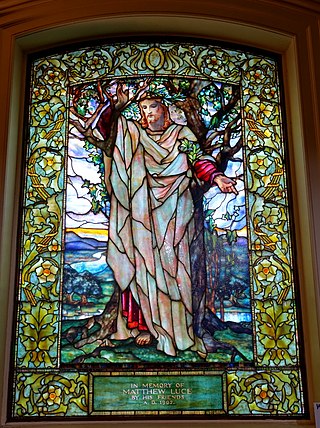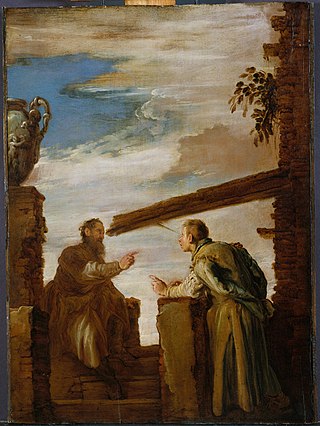
Matthew 6:10 is the tenth verse of the sixth chapter of the Gospel of Matthew in the New Testament and is part of the Sermon on the Mount. This verse is the second one of the Lord's Prayer, one of the best known parts of the entire New Testament. This verse contains the second and third petitions to God.

Matthew 5:8 is the eighth verse of the fifth chapter of the Gospel of Matthew in the New Testament. It is the sixth verse of the Sermon on the Mount, and also sixth of what are known as the Beatitudes.

Matthew 5:19 is the nineteenth verse of the fifth chapter of the Gospel of Matthew in the New Testament and is part of the Sermon on the Mount. Jesus has reported that he came not to destroy the law, but fulfil it. In this verse he perhaps continues to reinforce this claim.

Matthew 5:23 and Matthew 5:24 are a pair of closely related verses in the fifth chapter of the Gospel of Matthew in the New Testament. They are part of the Sermon on the Mount. Jesus has just announced that anger leads to murder, and anger is just as bad as murder itself. And that whosoever is angry with his brother shall be in danger of the judgment himself. This verse states that resolving these disputes should take priority over religious rituals.

Matthew 5:25 is the twenty-fifth verse of the fifth chapter of the Gospel of Matthew in the New Testament and is part of the Sermon on the Mount. In this first of the 6 Antitheses Jesus has been attacking anger and advocating reconciliation. In this verse he states that it is prudential to quickly reach agreement with one's adversary.

Matthew 5:29 is the twenty-ninth verse of the fifth chapter of the Gospel of Matthew in the New Testament and is part of the Sermon on the Mount. It is the third verse of the discussion of adultery.
Matthew 5:42 is the forty-second verse of the fifth chapter of the Gospel of Matthew in the New Testament and is part of the Sermon on the Mount. This is the fifth and last verse of the antithesis on the command: "Eye for an eye".

Matthew 5:45 is the forty-fifth verse of the fifth chapter of the Gospel of Matthew in the New Testament and is part of the Sermon on the Mount. This is the third verse of the final antithesis, that on the commandment: "Love thy neighbour as thyself". Jesus here explains why one must love one's enemies.

Matthew 6:1 is the first verse of the sixth chapter of the Gospel of Matthew in the New Testament and is part of the Sermon on the Mount. This verse begins the discussion of how even good deeds can be done for the wrong reasons.

Matthew 6:2 is the second verse of the sixth chapter of the Gospel of Matthew in the New Testament and is part of the Sermon on the Mount. This verse continues the discussion of how even good deeds can be done for the wrong reasons.

Matthew 6:3 is the third verse of the sixth chapter of the Gospel of Matthew in the New Testament and is part of the Sermon on the Mount. This verse continues the discussion of how one should give to charity.

Matthew 6:5 is the fifth verse of the sixth chapter of the Gospel of Matthew in the New Testament and is part of the Sermon on the Mount. This verse opens discussion on the proper procedure for praying.

Matthew 6:17 is the seventeenth verse of the sixth chapter of the Gospel of Matthew in the New Testament and is part of the Sermon on the Mount. This verse continues the discussion of fasting.

Matthew 6:18 is the eighteenth verse of the sixth chapter of the Gospel of Matthew in the New Testament and is part of the Sermon on the Mount. This verse concludes the discussion of fasting.

Matthew 6:22 is the twenty-second verse of the sixth chapter of the Gospel of Matthew in the New Testament, and is part of the Sermon on the Mount.

Matthew 6:23 is the twenty-third verse of the sixth chapter of the Gospel of Matthew in the New Testament and is part of the Sermon on the Mount.

Matthew 7:3 is the third verse of the seventh chapter of the Gospel of Matthew in the New Testament and is part of the Sermon on the Mount. This verse continues Jesus' warnings addressed to those who judge others.

Matthew 7:4 is the fourth verse of the seventh chapter of the Gospel of Matthew in the New Testament and is part of the Sermon on the Mount. This verse continues the discussion of judgmentalism.

Matthew 7:22 is the twenty-second verse of the seventh chapter of the Gospel of Matthew in the New Testament and is part of the Sermon on the Mount. This verse continues Jesus' warning against false prophets.
Matthew 9:35 is a verse in the ninth chapter of the Gospel of Matthew in the New Testament.


















